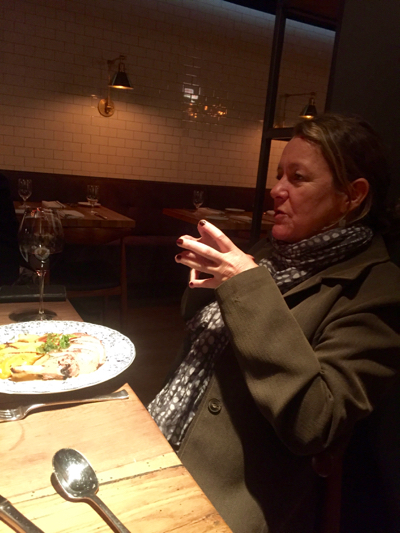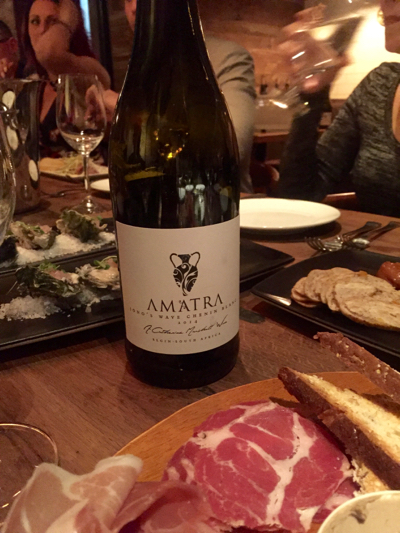We're Just Technicians
An evening with Catherine Marshall
In South African Wine on 12 Nov 2015
The first time I tried a Catherine Marshall wine I was at Aubergine Restaurant in Cape Town during my mom’s visit to SA. It was so different from anything I’d tasted in South Africa––clearly pinot noir, and yet so different from any pinot I’d ever had. Such delicate acidity, mineral undercurrents, with a truly South African dark-berries fruit profile. I still remember it.


I had a chance to relive that wine memory on Tuesday when I was invited to a dinner at the hip Taus Authentic wine bar hosted by Blue Crane Imports, a small Chicago-based South African wine importer, in honor of Catherine Marshall herself.
I was ecstatic about the chance to meet one of South Africa’s true garagistes, of course, but I got to do more than that––we sat together at dinner and I got to listen for hours as she talked us through a beautiful lineup of wines. We also talked about music (she shares my love of Lou Reed and Tom Waits) and swapped cellar stories. This was one of those defining moments where I step outside of myself for a second and echo David Byrne: How did I get here?
Catherine’s first job was actually at Blaauwklippen, in the early 90s. She worked at Vergelegen and Delaire after that, with stints in Bordeaux, Burgundy, Sonoma, and Oregon, and eventually became the first woman to own her own winery in South Africa. “You don’t think about what you’re doing at the time, you just do it,” she recalled, remembering one job interview where a man questioned whether she’d be strong enough for the cellar. “Later you look back and think, damn, I was tough!”
Catharine shared her passion for her home wine region of Elgin, the coolest in South Africa. “Freshness and fruit––those are the two words I want you to think about when you think about Elgin,” she explained.
Her wines reflect that ethic. The chenin, a revelation for me, sees no malo but some lees contact for a roundness that caresses the pristine fruit, and the SGM is a sinewy powerhouse with gorgeous black fruit and vibrance. Her pinots, which combine four clones grown in the fourteen different soil types on her site from sandstone to heavy clay, are an exercise in minimalist, fruit-driven winemaking––but Catherine doesn’t have any use for the “natural wine” pretense.
“Wine gets a lot of romance, but at the end of the day we’re technicians,” Catharine said at one point while describing the importance of her viticulture education. “It’s like being a chef; you want to have a deep understanding of the material that you’re using.” When Taus’s excellent chef came out to check on us, Catherine made a point to thank him personally, “one chef to another.”
Nights like this make me very aware of the division between my first years in the wine industry––hands dirty, cleaning out tanks and sanitizing equipment––and my current position that’s closer to the suit-and-tie end of the spectrum. I feel more in common with winemakers than somms despite all my years in retail and writing, and I’m not sure that will ever go away. I can’t deny that more than anything else, Catherine Marshall wines make me want to make my own.